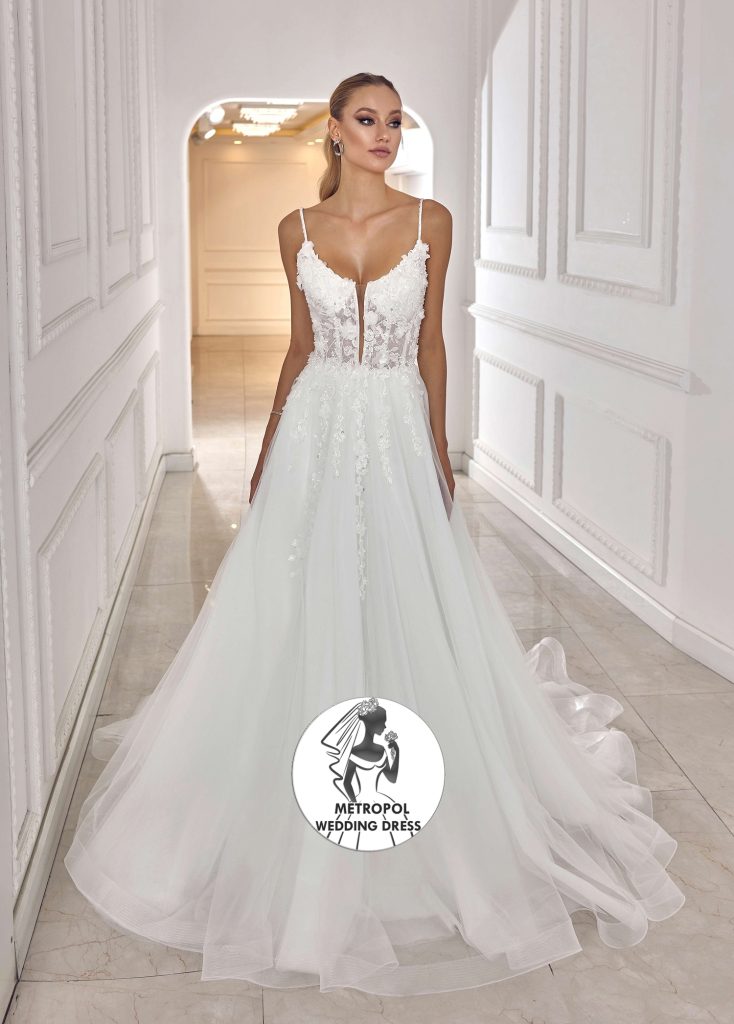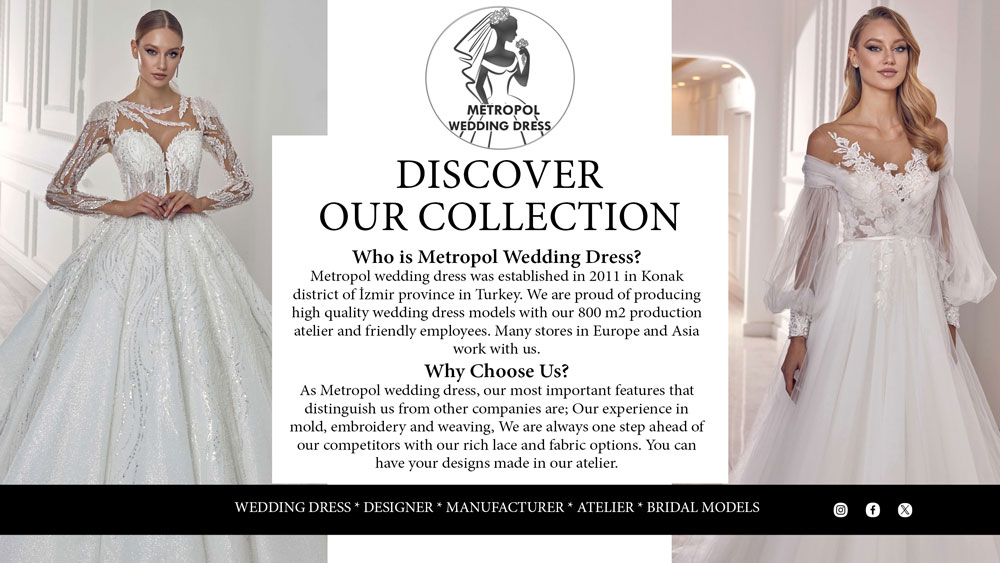
Wholesale Wedding Dress Suppliers Your Source for Elegance The wedding dress industry is a vibrant and ever-evolving sector, driven by the dreams of brides seeking elegance, style, and affordability. For retailers, boutique owners, and wedding planners, partnering with reliable wholesale wedding dress suppliers is the key to offering stunning gowns that captivate customers without breaking the bank. This comprehensive 5,000-word guide explores the world of wholesale wedding dress suppliers, delving into their role in the bridal market, how to choose the right partners, and strategies for leveraging their offerings to build a successful business. Crafted with SEO best practices in mind, this article is designed to help businesses navigate the competitive landscape of bridal retail while providing actionable insights for sourcing elegant wedding dresses.
The Importance of Wholesale Wedding Dress Suppliers
Wholesale wedding dress suppliers are the backbone of the bridal retail industry, providing retailers with access to a wide range of gowns at competitive prices. By sourcing dresses directly from manufacturers or distributors, businesses can offer high-quality, elegant designs that appeal to a diverse customer base.
Bridging the Gap Between Manufacturers and Retailers
Suppliers act as intermediaries, connecting bridal retailers with manufacturers who produce dresses in bulk. This relationship allows retailers to access a steady supply of inventory without the need to manage production processes directly.
Enabling Affordable Elegance
By purchasing dresses in large quantities, suppliers secure lower prices, which they pass on to retailers. This cost efficiency enables boutiques and online stores to offer elegant wedding dresses at prices that appeal to budget-conscious brides.
Supporting Business Scalability
For growing bridal businesses, wholesale suppliers provide the inventory needed to meet increasing demand. Whether expanding into new markets or catering to peak wedding seasons, reliable suppliers ensure a consistent flow of dresses.
Understanding the Wholesale Wedding Dress Market
The global wedding dress market is influenced by fashion trends, consumer preferences, and economic factors. To succeed, retailers must understand the dynamics of this market and the role suppliers play in shaping it.
Key Market Trends
Wedding dress styles are constantly evolving, with trends like bohemian, vintage, and minimalist designs gaining popularity. Suppliers who stay ahead of these trends offer retailers a competitive edge by providing dresses that align with current demand.
Wholesale Wedding Dress Suppliers Your Source for Elegance
Sustainability is a growing priority for brides. Suppliers offering dresses made from organic fabrics, recycled materials, or ethically sourced embellishments are increasingly sought after by environmentally conscious retailers.
Inclusive Sizing and Diversity
The bridal industry is becoming more inclusive, with demand for plus-size, petite, and culturally diverse designs on the rise. Suppliers who provide a wide range of sizes and styles cater to a broader audience, helping retailers attract diverse customers.
Major Players in the Wholesale Market
The wholesale wedding dress market is dominated by suppliers in countries like China, India, Vietnam, and Turkey, where production costs are low, and craftsmanship is exceptional. Online platforms like Alibaba, Made-in-China, and TradeIndia connect retailers with suppliers, offering a vast selection of dresses.
Regional Preferences in Wedding Dresses
Bridal preferences vary by region. For example, North American brides often prefer romantic, lace-heavy designs, while European brides may favor sleek, modern silhouettes. Suppliers who understand these differences help retailers stock dresses that resonate with their target markets.
Benefits of Partnering with Wholesale Wedding Dress Suppliers
Collaborating with reputable suppliers offers numerous advantages for bridal retailers, from cost savings to enhanced customer satisfaction. Below are the key benefits of working with wholesale wedding dress suppliers.
Cost Efficiency and Profitability
Suppliers offer dresses at significantly lower prices than retail, allowing businesses to maintain healthy profit margins. This cost efficiency is especially valuable for small boutiques competing with larger bridal chains.
Access to Diverse Inventory
Wholesale suppliers typically offer a wide range of styles, from traditional ball gowns to contemporary sheath dresses. This variety enables retailers to cater to different tastes and budgets, attracting a broader customer base.
Customization and Flexibility
Many suppliers provide customization options, such as adjusting sizes, colors, or embellishments. This flexibility allows retailers to offer personalized dresses without the high costs of bespoke design.
Reliable Supply Chain
Partnering with established suppliers ensures a consistent supply of dresses, reducing the risk of stock shortages during peak wedding seasons. This reliability is critical for maintaining customer trust and meeting demand.
How to Choose the Right Wholesale Wedding Dress Supplier
Selecting the right supplier is a critical decision that can impact a retailer’s success. Below are practical steps to evaluate and choose wholesale wedding dress suppliers that align with your business goals.
Researching Potential Suppliers
Start by identifying suppliers through online marketplaces, industry directories, or bridal trade shows. Look for suppliers with positive reviews, clear communication, and a proven track record of delivering quality dresses.
Online Marketplaces
Platforms like Alibaba, DHgate, and Global Sources are excellent starting points for finding suppliers. These marketplaces provide detailed supplier profiles, customer feedback, and product catalogs to aid decision-making.
Bridal Trade Shows
Events like the New York Bridal Fashion Week or the London Bridal Show offer opportunities to meet suppliers in person, inspect dress quality, and negotiate terms. These shows also provide insights into upcoming trends.
Assessing Dress Quality
Quality is paramount in the bridal industry, as brides expect flawless gowns for their special day. Request samples from potential suppliers to evaluate fabric quality, stitching, and embellishments before committing to bulk orders.
Evaluating Supplier Reliability
Reliable suppliers deliver orders on time and maintain consistent quality. Check supplier ratings, read customer reviews, and ask for references to gauge their dependability. Clear communication and responsive customer service are also key indicators of a trustworthy supplier.
Negotiating Terms and Pricing
Negotiate with suppliers to secure favorable pricing, payment terms, and shipping arrangements. Discuss order minimums, customization options, and return policies to ensure the partnership aligns with your business needs.
Considering Logistics and Shipping
When sourcing dresses from international suppliers, factor in shipping costs, delivery times, and customs regulations. Choose suppliers with reliable shipping partners and transparent documentation to avoid delays or unexpected fees.
Challenges of Working with Wholesale Wedding Dress Suppliers
While partnering with suppliers offers many benefits, it also comes with challenges. Being aware of these issues can help retailers mitigate risks and build stronger partnerships.
Inconsistent Quality
Not all suppliers maintain consistent quality across large orders. To avoid receiving subpar dresses, request samples, establish clear quality standards, and conduct regular inspections.
Communication Barriers
Working with international suppliers can lead to communication challenges due to language differences or time zones. Choose suppliers with responsive customer service and clear communication channels.
Shipping and Logistics Issues
International shipping can be unpredictable, with delays caused by customs, weather, or logistical challenges. Plan ahead, order early, and work with suppliers who offer reliable shipping options.
Managing Inventory and Overstock
Bulk purchasing requires effective inventory management to avoid overstocking or understocking. Invest in inventory tracking systems and forecast demand based on seasonal trends to optimize stock levels.

Tips for Retailers Partnering with Wholesale Suppliers
To maximize the benefits of working with wholesale wedding dress suppliers, retailers should focus on operational efficiency, customer satisfaction, and strategic marketing. Below are practical tips for success.
Prioritize Customer Service
Offer personalized support, such as virtual fittings, sizing guides, and flexible return policies. Exceptional customer service builds trust and encourages repeat business.
Invest in Professional Photography
High-quality images showcase the elegance of your dresses and attract customers. Use multiple angles, close-ups of details, and lifestyle shots to highlight each gown’s unique features.
Build a User-Friendly Website
Ensure your website is mobile-friendly, easy to navigate, and optimized for conversions. Include clear calls-to-action, such as “Shop Now” or “Contact Supplier,” to guide customers through the purchasing process.
Stay Updated on Trends
Monitor bridal fashion trends and collaborate with suppliers to stock the latest styles. Follow designers on social media and subscribe to industry publications to stay informed.
Foster Long-Term Supplier Relationships
Building strong relationships with suppliers can lead to better pricing, priority service, and exclusive designs. Communicate regularly, provide feedback, and negotiate mutually beneficial terms.
The Future of Wholesale Wedding Dress Suppliers
The wholesale wedding dress industry is evolving, driven by technological advancements, changing consumer preferences, and global market trends. Below are key developments shaping the future of this sector.
Growth of E-Commerce
Online retail is transforming the bridal industry, with more retailers and brides shopping online. Suppliers with robust e-commerce platforms and global shipping capabilities will dominate the market.
Advancements in Technology
Technologies like virtual try-on tools, 3D visualization, and AI-driven design platforms are enhancing the wholesale experience. Retailers can leverage these tools to help brides visualize dresses and make informed purchases.
Emphasis on Sustainability
As sustainability becomes a core consumer value, suppliers must prioritize eco-friendly materials and ethical production practices. Offering sustainable dresses will attract environmentally conscious retailers and brides.
Expansion of Inclusive Offerings
The demand for inclusive sizing and culturally diverse designs is growing. Suppliers who provide a wide range of sizes, styles, and cultural inspirations will appeal to a global audience.
Conclusion
Wholesale wedding dress suppliers are essential partners for retailers seeking to offer elegant, high-quality gowns at competitive prices. By choosing reliable suppliers, implementing SEO strategies, and addressing challenges like quality control and logistics, businesses can thrive in the competitive bridal market. With the right approach, wholesale wedding dress suppliers provide a gateway to success, enabling retailers to deliver glamour and elegance to brides worldwide.
The wedding dress industry thrives on the promise of elegance, and wholesale wedding dress suppliers play a pivotal role in delivering stunning gowns to retailers and brides worldwide. For boutique owners, online retailers, and wedding planners, partnering with reliable suppliers ensures access to high-quality dresses at affordable prices. This 1,000-word guide explores the importance of wholesale wedding dress suppliers, how to choose the right ones, and strategies for leveraging their offerings to succeed in the competitive bridal market. Optimized for SEO, this article provides actionable insights for businesses aiming to source elegant wedding dresses efficiently.
Why Wholesale Wedding Dress Suppliers Matter
Wholesale suppliers are the backbone of the bridal retail industry, connecting manufacturers with retailers to provide a steady supply of wedding dresses. Their role is critical in helping businesses offer glamorous gowns while maintaining profitability.
Cost-Effective Sourcing
By purchasing dresses in bulk, suppliers secure lower prices from manufacturers, passing these savings on to retailers. This allows boutiques and online stores to offer elegant dresses at competitive prices, appealing to budget-conscious brides.
Diverse Inventory Options
Suppliers offer a wide range of styles, from classic ball gowns to modern minimalist designs. This variety enables retailers to cater to diverse customer preferences, ensuring they have something for every bride.
Scalability for Businesses
For growing bridal businesses, suppliers provide the inventory needed to meet rising demand. Whether expanding into new markets or preparing for peak wedding seasons, reliable suppliers ensure a consistent flow of dresses.
Understanding the Wholesale Wedding Dress Market
The global wedding dress market is shaped by fashion trends, consumer preferences, and economic factors. Retailers must understand these dynamics to select suppliers that align with their business goals.
Emerging Trends in Wedding Dresses
Bridal fashion evolves rapidly, with trends like bohemian chic, sustainable fabrics, and inclusive sizing gaining traction. Suppliers who offer dresses reflecting these trends help retailers stay competitive.
Sustainable and Ethical Designs
Eco-conscious brides increasingly seek dresses made from organic cotton, recycled lace, or biodegradable materials. Suppliers prioritizing sustainable practices appeal to this growing market segment.
Inclusive and Diverse Styles
Demand for plus-size, petite, and culturally inspired dresses is rising. Suppliers offering inclusive sizing and diverse designs enable retailers to attract a broader customer base.
Key Players in the Market
Major suppliers operate in countries like China, India, and Vietnam, where production costs are low, and craftsmanship is high. Platforms like Alibaba, DHgate, and Made-in-China connect retailers with suppliers, offering extensive dress catalogs.

Benefits of Partnering with Wholesale Suppliers
Collaborating with wholesale wedding dress suppliers offers numerous advantages, from cost savings to enhanced customer satisfaction.
Lower Costs, Higher Margins
Suppliers provide dresses at significantly lower prices than retail, allowing businesses to maintain healthy profit margins while offering affordable gowns to customers.
Access to Customization
Many suppliers offer customization options, such as adjusting sizes, colors, or embellishments. This flexibility allows retailers to meet specific customer needs without the high costs of bespoke design.
Reliable Inventory Supply
Partnering with established suppliers ensures a steady supply of dresses, reducing the risk of stock shortages during busy wedding seasons. This reliability is crucial for maintaining customer trust.
How to Choose the Right Wholesale Supplier
Selecting a reliable supplier is critical for business success. Below are practical steps to evaluate and choose wholesale wedding dress suppliers.
Researching Suppliers
Start by exploring online marketplaces, industry directories, or bridal trade shows. Look for suppliers with positive reviews, transparent pricing, and a history of delivering quality dresses.
Online Marketplaces
Platforms like Alibaba and DHgate provide detailed supplier profiles, customer feedback, and product catalogs. These resources help retailers compare options and identify trustworthy partners.
Bridal Trade Shows
Events like the National Bridal Market or Harrogate Bridal Show allow retailers to meet suppliers in person, inspect dress quality, and negotiate terms. These shows also offer insights into upcoming trends.
Evaluating Dress Quality
Quality is non-negotiable in the bridal industry. Request samples to assess fabric, stitching, and embellishments. High-quality dresses ensure customer satisfaction and reduce returns.
Checking Supplier Reliability
Reliable suppliers deliver orders on time and maintain consistent quality. Review ratings, read customer feedback, and ask for references to gauge dependability. Responsive communication is also a key indicator.
Negotiating Terms
Negotiate pricing, payment terms, and shipping arrangements to secure favorable deals. Discuss order minimums and return policies to ensure the partnership aligns with your business needs.






